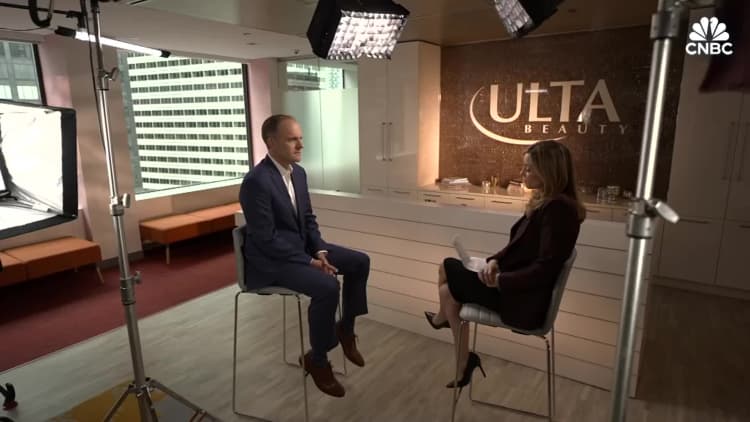

Read CNBC’s full investigation Police say the gangs are stealing and reselling merchandise from retailers such as Ulta Beauty, TJ Maxx and Walgreens.
Ulta Beauty CEO Dave Kimbell is blaming part of the blame on e-commerce in the face of a sophisticated, organized retail crime ring that investigators say targeted his company website.
In the first in-depth interview a retail CEO has given about organized theft, Kimbell responded to a months-long CNBC investigation that revealed how police dismantled what they said was a network of professional thieves who used Amazon to redirect Selling millions in cosmetics stolen from Ulta stores and other retailers across the U.S.
While Kimbell did not comment directly on Amazon, he said the online marketplace was “part of the problem.”
“(Online marketplaces) give people more scale and more opportunities to monetize the product,” Kimbell said in an on-camera interview with CNBC. “In the past, you had to sell stolen goods at a flea market or out of a car trunk. , or just sell it locally. Now you have more sophisticated tools to expand your reach nationally or even internationally.”
As part of an investigation into retail crime rings and efforts by companies and law enforcement to combat the problem, CNBC is following a case involving Michelle Mack, a San Diego woman who prosecutors accuse of using her Amazon Digital Storefront resale items stolen from stores.
The 53-year-old mother of three and her husband, Kenneth Mack, were charged with conspiracy to commit organized retail theft, grand larceny and receiving stolen property in connection with an alleged criminal gang. California Highway Patrol and Department of Homeland Security agents raided her California mansion in December and said they found $387,000 worth of suspected stolen goods, much of it from Ulta. Investigators say her criminal enterprise made millions of dollars over more than a decade. Michelle Mack and Kenneth Mack have both pleaded not guilty.
To Kimbell, the scale of the operation comes as no surprise.
“Unfortunately, I’m not that shocked because we’ve seen this in other parts of the country,” Kimbell said. “The seriousness of this incident is significant. But this is what’s happening, That’s the environment we operate in.”
Ulta Beauty CEO Dave Kimbell said online marketplaces need to do more to prevent the sale of stolen goods.
CNBC
Kimbell said he doesn’t believe it’s the responsibility of consumers to evaluate whether products they buy from online marketplaces have been stolen. It may not even occur to many shoppers that the products could be stolen from one retailer and sold by another, he said, adding that this is primarily an online phenomenon.
“This doesn’t happen in a brick-and-mortar (store). You don’t walk into a retailer and see someone (selling) stolen goods on a table in the front,” Kimbell said. “We shouldn’t have an environment where information is stolen from one retailer and ends up on any other platform, any other large mainstream platform.”
Anyone selling products online “should be committed to ensuring that the products they are selling are not stolen goods,” Kimbell said.
“I can tell you with 100 percent certainty that none of the products we sell on Ulta.com or any online platform are stolen from other retailers,” he said. “With the tools, with the data, with the analytics, with the capabilities that we all have together, we can try to take more action.”
Amazon declined CNBC’s request for an interview but said in a statement that the e-commerce giant has “zero tolerance for the sale of stolen goods.” An Amazon spokesperson said the company invests $1 billion annually and employs “thousands of people” to fight fraud, including detection and prevention tools.
The spokesperson said Amazon works with law enforcement and other retailers to “stop bad actors and hold them accountable.”
In the Mack case, Amazon said it had received no signals that sellers were unloading stolen goods. After Mack’s arrest, her page was deleted.
How serious is organized retail crime?
It’s unclear how serious organized retail crime is. The National Retail Federation and Retail Industry Leaders Association say not all instances are reported, tracked or counted.
According to the latest NRF survey on shrinkage (the industry term for inventory loss due to shrinkage, theft or other reasons), the total value of goods stolen in external theft incidents in 2022 will reach $40.5 billion, accounting for 36.15% of total shrinkage, while 2022 USD 3.7 billion annually. 2021 percentage.
Ulta Beauty is one of many retailers that has begun discussing the issue of retail crime but has yet to quantify the impact of the issue on their business. Ulta Beauty Chief Financial Officer Scott Settersten and Chief Operating Officer Kecia Steelman have specifically discussed theft or organized retail crime on earnings calls or investor meetings.
Ulta Beauty said it aims to keep all fragrances locked in stores within the first few months of the year. Fragrance has been one of the hardest-hit categories for the retailer because of its high value and relative ease of resale, Kimbell said.
The CEO did not quantify the increase in organized retail crime his company has seen, but said “it’s definitely getting worse.”
“Retail crime has always been a part of the retail industry … but we’ve seen a significant rise over the last few years, really over the last few years,” he said.
The NRF survey revealed that retail executives are increasingly concerned about an increase in theft-related violence, with 81% reporting an increase in violence and 28% saying their companies have closed specific locations due to crime. Ulta said it has not closed a store due to crime.
Kimbell said he’s particularly concerned about the impact of rising crime on Ulta’s 50,000 employees at its 1,400 stores nationwide.
“These situations… they’re not funny… they’re threatening; they’re intimidating,” Kimbell said. “They can be traumatic.”
– Additional reporting by Ali McCadden.







